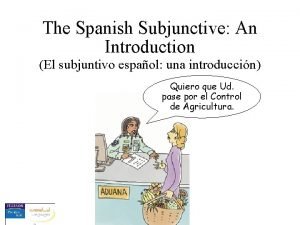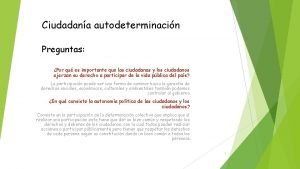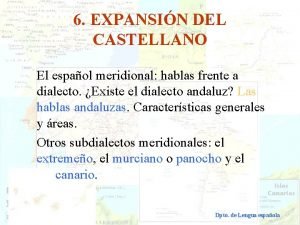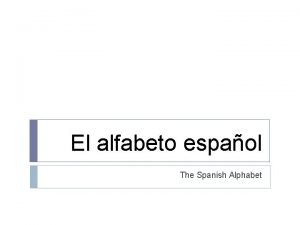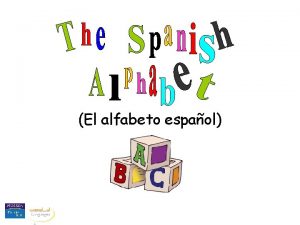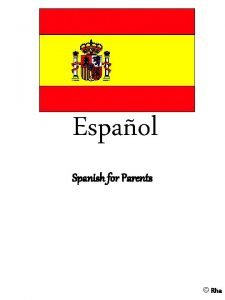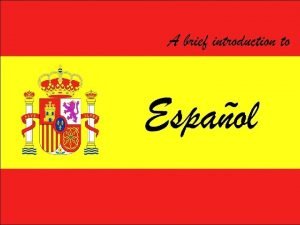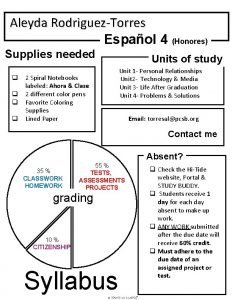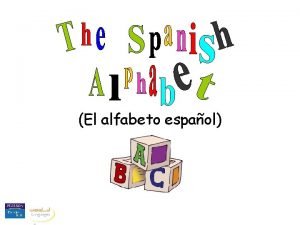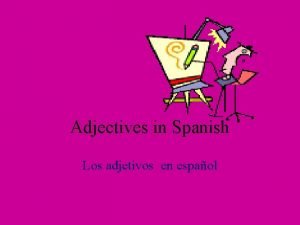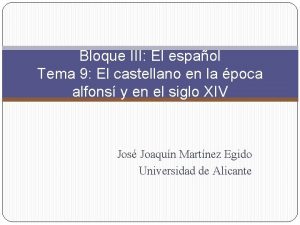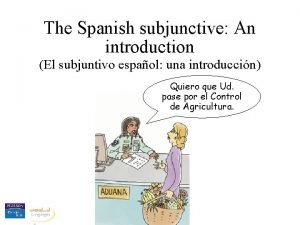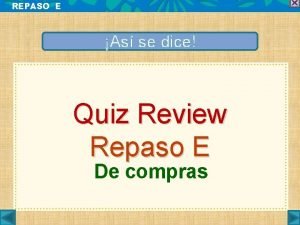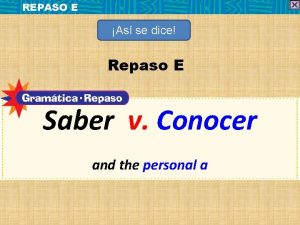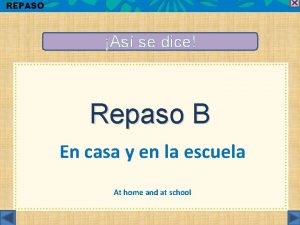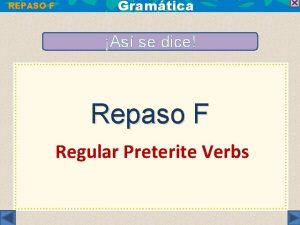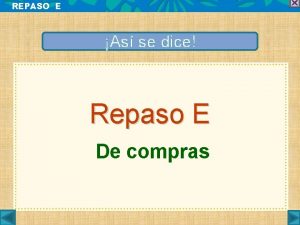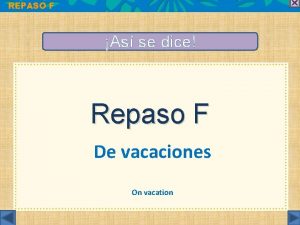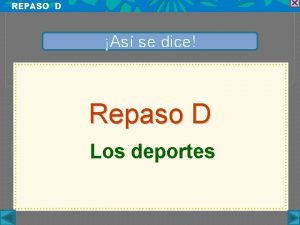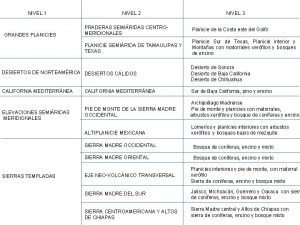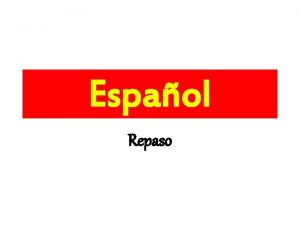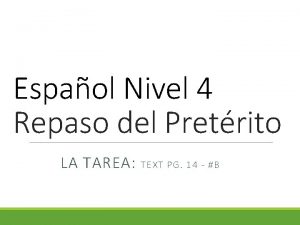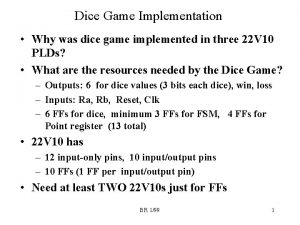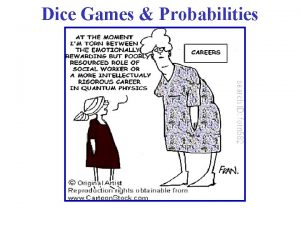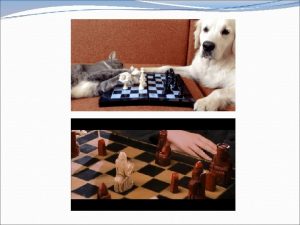As Se Dice Nivel 3 REPASO Espaol III

















- Slides: 17

¡Así Se Dice! Nivel 3 REPASO Español III Apollo High School

Metas de Aprendizaje v Students will review the present tense forms in Spanish and be able to use them to talk about themselves and others. v Students will review Stem-Changing verbs in the present tense and be able to use them to talk about themselves and others. v Students will review how to use SER and ESTAR correctly in Spanish. v Students will review how to use reflexive verbs in Spanish.

Present Tense of Regular Verbs: Regular Present Tense Verb Forms: -ar -er -ir hablar comer vivir hablo como vivo hablas comes vives usted / él / ella habla come vive nosotros / nosotras hablamos comemos vivimos vosotros / vosotras habláis coméis vivís ustedes / ellos / ellas hablan comen viven yo tú

Present Tense of Irregular Verbs in YO form only: ir = to go dar = to give voy vamos doy damos vais dais va van da dan estar = to be estoy estamos estáis están

Present Tense of Irregular YO Verbs: hacer traer saber producir to make, to do to bring to know to produce yo hago traigo sé produzco tú haces traes sabes produces poner salir conocer conducir to put to go out, to leave to know a person to drive yo pongo salgo conozco conduzco tú pones sales conoces conduces

¿SER or ESTAR? SER = to be D Description O Origin N Noun T Time (calendar also) ESTAR = to be H Health A Action L Location F Feeling B Belongs to Rafael es de Panamá. Es alto y simpático. Su padre es maestro. Carmen está en casa; está enferma. Está durmiendo.

SER & ESTAR Ser = to be Soy Somos Eres Sois Es Son Estar = to be Estoy Estamos Estáis Está están

Stem-Changing Verbs: E -> IE empezar = to begin querer = to want empiezo empezamos quiero queremos empiezas empezáis quieres queréis empiezan quieren E -> IE preferir = to prefer prefiero preferimos prefieres preferís prefieren jugar = to play juego jugamos juegas jugáis juegan JUGAR is the only verb with a U->UE stem-change.

Stem-Changing Verbs: ( o-> ue) volver = to return poder = to be able to, can vuelvo volvemos puedo podemos vuelves volvéis puedes podéis vuelven pueden dormir = to sleep duermo dormimos duermes dormís duermen

Reflexive pronouns Reflexive Verbs me nos te os se se lavarse = to wash levantarse = to get up acostarse = to go to bed yo me lavo me levanto me acuesto tú te lavas te levantas te acuestas usted / él / ella se lava se levanta se acuesta nosotros/ nosotras nos lavamos nos levantamos nos acostamos vosotros / vosotras os laváis os levantáis os acostáis Uds. / ellos / ellas se lavan se levantan se acuestan

Gustar and similar verbs Gustar is used with indirect object pronouns to tell what pleases people. The Indirect Pronoun goes BEFORE the conjugated verb and is followed by a noun indicating the thing that pleases. I. O. P. With gustar and similar verbs, we only use the me nos rd 3 person singular and plural forms of the verbs. te os le les I like chocolate = Me gusta el chocolate. She like cats. = Le gustan los gatos (a ella).

Verbs like gustar Aburrir to bore Le aburren los documentos a José. Doler to hurt Me duele la espalda. Encantar to love Nos encanta mirar películas. Enojar to anger Me enojan los trabajos tardes. Faltar to lack Me falta energia para correr. Fascinar to fascinate ¿Te fascinan los grupos de pop? Importar to matter A Teresa le importa mucho su familia. Interesar to interest Me interesan los libros de gastronomia. Molestarto annoy Picar to itch Parecer to seem Quedar to remain A Julia le molesta mucho el despertador. A los niños les pican los tobillos. ¿Te parece una buena idea estudiar juntos? Nos quedan diez dólares.

En Español: 1. Me gusta el chocolate. 2. (A ella) Le gustan los gatos. 3. ¿Te gustan las verduras? 4. Me interesan los deportes. 5. A Juan le duele la cabeza. 6. Me molesta mucho mi hermana menor. 7. Me pica el brazo.

Pronombres de Complemento Directo The direct object is the receiver of the action of the verb. (answers the questions: what? who? ) El peaje? Ella lo pagó. ¿Los boletos? Los compraron. ¿Te vio? Sí, me vio. Review the forms of the direct object pronouns: me nos te os lo los la las

¿SABER or CONOCER? Saber = to know Conocer = to know 1. Factual information 1. Familiar with a person, place or thing 2. How to do something Saber No sé cómo se llama la nueva sé estudiante. sabemos sabes sabéis Ella sabe tocar la guitarra. saben 2. Meeting someone for the first time. ¿Conoces Nueva York? Conocer conozco conocemos Quiero conocer a conocéis tu conoces hermano. conoce

Unequal Comparisons To compare differences between people and things, Spanish uses these comparisons: más + adjective / adverb / noun + que Estos camareros son más amables que aquéllos. menos + adjective / adverb / noun + que El supermercado tiene menos verduras que el mercado. To compare differences between actions, use these adverbial phrases: más que … Me gusta la comida salada más que la comida dulce. menos que… Yo como menos que tú. mayor older menor younger mejor better peor worse

Equal Comparisons To compare similarities between people and things, use these phrases: tan + adjective / adverb + como La tarta es tan sabrosa como el flan. tanto (a, os, as) + noun + como La sopa tiene tanta pimienta como sal. tanto como… Cocino tanto como tú.
 Hamlet act iii scene ii
Hamlet act iii scene ii Escapaa
Escapaa Examen de ciudadana 2020 en espaol
Examen de ciudadana 2020 en espaol Idioma espaol
Idioma espaol Preguntas de ciudadania en espaol
Preguntas de ciudadania en espaol El espaol
El espaol Abecedario espaol
Abecedario espaol Vowel + y
Vowel + y Puntos cardinales españa
Puntos cardinales españa Trabajos en espaol birmingham
Trabajos en espaol birmingham Aprender espaol
Aprender espaol Citizenship test en espaol
Citizenship test en espaol Abecedario espaol
Abecedario espaol Positive adjectives in spanish
Positive adjectives in spanish Preguntas para miguel hidalgo
Preguntas para miguel hidalgo El espaol
El espaol Letras consonantes
Letras consonantes Espaol
Espaol

